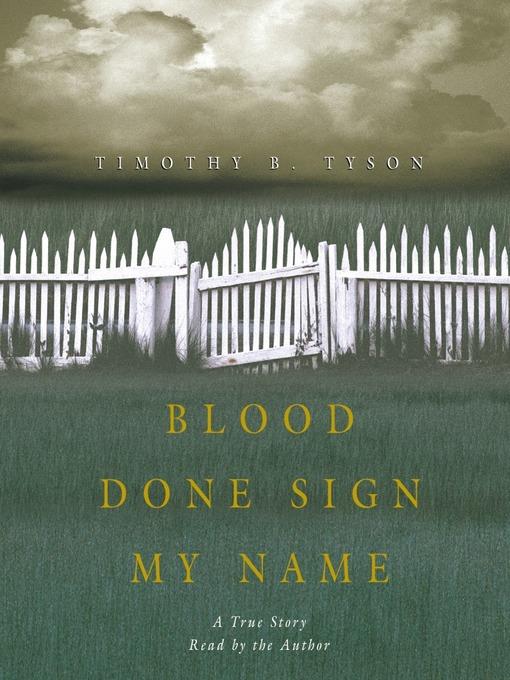
Blood Done Sign My Name
A True Story
کتاب های مرتبط
- اطلاعات
- نقد و بررسی
- دیدگاه کاربران
نقد و بررسی

In 1970, when Tim Tyson was a 10-year-old in Oxford, North Carolina, an African-American Vietnam veteran was beaten and murdered by white men in broad daylight in full view of witnesses. The riots that followed, along with the trial and subsequent acquittal of the killers, triggered Tyson's lifelong commitment to unraveling the twisted fabric of race relations in this country. Robertson Dean's reading and Tyson's clear-eyed, scrupulously researched work offer more than a popular history of the Civil Rights movement. Tyson, not an apologist for moderate whites, acknowledges that even those who preached change, among them his Methodist minister father, ultimately did little good. "Gradualism rested on empty promises. Later always meant never." Robertson Dean's narration provides wit and warmth, making this nonfiction account as riveting as any novel. S.J.H. (c) AudioFile 2004, Portland, Maine

Starred review from April 19, 2004
In this outstanding personal history, Tyson, a professor of African-American studies who's white, unflinchingly examines the civil rights struggle in the South. The book focuses on the murder of a young black man, Henry Marrow, in 1970, a tragedy that dramatically widened the racial gap in the author's hometown of Oxford, N.C. Tyson portrays the killing and its aftermath from multiple perspectives, including that of his contemporary, 10-year-old self; his progressive Methodist pastor father, who strove to lead his parishioners to overcome their prejudices; members of the disempowered black community; one of the killers; and his older self, who comes to Oxford with a historian's eye. He also artfully interweaves the history of race relations in the South, carefully and convincingly rejecting less complex and self-serving versions ("violence and nonviolence were both more ethically complicated—and more tightly intertwined—than they appeared in most media accounts and history books"). A gifted writer, he celebrates a number of inspirational unsung heroes, ranging from his father to a respected elderly schoolteacher who spoke out at a crucial point to quash a white congregation's rebellion over an invitation to a black minister. Tyson's avoidance of stereotypes and simple answers brings a shameful recent era in our country's history to vivid life. This book deserves the largest possible audience. Agent, Charlotte Sheedy at Sterling Lord Literistic. 8-city author tour. (May 18)
FYI:
Tyson's last book,
Radio Free Dixie: Robert F. Williams and the Roots of Black Power (1999), won the James Rawley Prize and was co-winner of the Frederick Jackson Turner Prize.

























دیدگاه کاربران